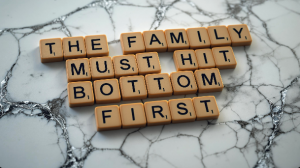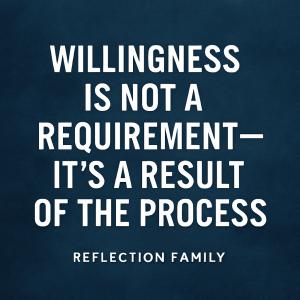'The Family Must Hit Bottom First' Reflection Family Interventions Dismantles the Myth of Rock Bottom
Reflection Family Interventions is challenging one of the most dangerous myths in addiction: that the person must hit “rock bottom” before they’ll accept help.
Families, clinicians, and treatment centers are invited to explore this powerful reframe at www.reflectionfamilyinterventions.com or by calling (888) 414-2894. Learn how your family can stop waiting and start leading recovery—today.
Turning the Myth on Its Head: Why the Family’s Bottom Matters More
The belief that someone must “lose everything” before they’ll accept help has cost countless lives. According to RFI’s team of expert interventionists, this mindset delays action and fuels denial—for both the loved one and the family. This belief has been effectively proven false in clinical studies over and over again.
“The truth is, most addicted individuals don’t wake up one day and decide to change on their own,” said Andrew Engbring, Founder of Reflection Family Interventions. “when the family hits their emotional, financial, or spiritual bottom—and stops enabling, rescuing, or tolerating dysfunction—that's when everything shifts.”
Drawing from the science in SAMHSA’s TIP 39: Substance Use Disorder Treatment and Family Therapy, RFI urges families to stop waiting for disaster and instead become the catalyst for recovery by changing their own behaviors, boundaries, and beliefs.
Willingness Is Not a Requirement—It’s a Result of the Process
Willingness is often misunderstood as a prerequisite for entering treatment, but in reality, it is a dynamic quality that can be nurtured and strengthened throughout the recovery process. Many individuals begin treatment feeling ambivalent or outright resistant—not because they lack the capacity for change, but because fear, shame, trauma, or denial cloud their ability to engage fully. What’s often overlooked is that willingness doesn't have to precede treatment—it can emerge from it. Through consistent structure, compassionate accountability, and therapeutic engagement, treatment environments are uniquely positioned to help dissolve resistance and foster openness.
In fact, multiple clinical studies have shown that individuals who enter treatment with low initial motivation or high resistance can achieve equal or even better outcomes compared to those who start with high levels of willingness. According to data from the National Institute on Drug Abuse (NIDA) and research published in journals such as Addiction and Journal of Substance Abuse Treatment, it’s not the degree of motivation at entry that predicts success—it’s the quality and continuity of care, the support system, and the ability of the treatment process to build insight and accountability over time. As clients begin to experience small but meaningful wins—improved mood, physical stability, reconnection with loved ones, or even moments of inner calm—their capacity and willingness to change begins to grow.
This is the heart of intervention: not expecting full willingness on day one, but creating the therapeutic conditions where willingness can take root, evolve, and flourish. Recovery is not reserved for the ready—it’s built for the willing, and willingness itself can be built.
A Paradigm Shift: Families as the First Movers in Recovery
Reflection Family Interventions teaches that waiting for the addicted loved one to want help is passive—and dangerous. Instead, families can create a tipping point by:
-Setting clear, non-negotiable boundaries
-Stopping codependent and enabling behaviors
-Doing their own healing work, regardless of the loved one’s choices
“Intervention is not a confrontation—it’s an awakening,” said Tiffany Johnson, Lead Interventionist at RFI. “Families must lead recovery by example. When they change, the entire system begins to shift.”
What Makes Reflection Family Interventions Different?
-Flipping the Focus
Where most programs treat the addicted person as the client, RFI treats the family system as the client—because change that sticks must start at the root.
-Six-Month Family Coaching Curriculum
With a structured blend of psychoeducation, wellness integration, and real-world application, RFI’s program supports families well beyond the initial intervention.
-Family-Owned, Lived-Experience Team
RFI is run by a family that survived addiction and mental health crises firsthand. Their blend of professional expertise and lived insight makes them uniquely qualified to walk families through real, lasting change.
-Support Regardless of the Addicted Person’s Engagement
Whether or not the loved one accepts help, RFI empowers families to reclaim their peace, strength, and clarity—and end the chaos in their homes.
From Crisis Control to Family-Led Recovery
Reflection Family Interventions guides families from the chaos of reactivity to the calm of intentionality. They help families move from asking “Why won’t they change?” to “What are we doing that allows this to continue?”
Key coaching goals include:
Identifying and replacing enabling behaviors
Strengthening family accountability and communication
Building resilience through health, structure, and values
Reclaiming emotional stability—even if the addicted person doesn’t change
“We often say: ‘You’re not waiting on your loved one—you’re waiting on yourself.’ When the family changes, the outcomes change,” said Andrew Engbring.
Join the Movement: Challenge the Rock Bottom Myth
Reflection Family Interventions is calling on:
-Families to stop waiting for things to get worse—and start leading
-Clinicians to center family dynamics as part of the treatment plan
-Treatment centers to offer robust, structured family programming
-The public to shift the narrative from passivity to empowerment
About Reflection Family Interventions
Reflection Family Interventions is a national intervention and family recovery coaching firm helping families take back control from the chaos of addiction and mental illness. Founded by a family that has walked the same road, RFI delivers a clinically informed, emotionally grounded, and action-focused approach that transforms families—whether their loved one accepts help or not.
Visit www.reflectionfamilyinterventions.com or call (888) 414-2894 to schedule a consultation.
Andrew Engbring
Reflection Family Interventions
contact@reflectionfamilyinterventions.com
Visit us on social media:
Facebook
YouTube
TikTok
Legal Disclaimer:
EIN Presswire provides this news content "as is" without warranty of any kind. We do not accept any responsibility or liability for the accuracy, content, images, videos, licenses, completeness, legality, or reliability of the information contained in this article. If you have any complaints or copyright issues related to this article, kindly contact the author above.
Arab America Foundation Announces Speakers for CONNECT Empowerment Summit in New York/New Jersey, October 24-25, 2025
Hospital-acquired Bedsore and Death Claim Filed Against Alabama Hospitals
New Bedford Community Health Receives $1.5 Million Lead Gift from The Manton Foundation to Expand Access to Primary Care
Więcej ważnych informacji
 Jedynka Newserii
Jedynka Newserii

 Jedynka Newserii
Jedynka Newserii

Prawo

Kolejne polskie miasta chcą być przyjazne dzieciom. Planują stworzyć najmłodszym dobre warunki do rozwoju
Cztery miasta w Polsce posiadają tytuł Miasta Przyjaznego Dzieciom nadany przez UNICEF Polska. Dziewięć kolejnych miast czeka na certyfikację, a w ostatnich miesiącach do programu zgłosiło się kilka następnych. Na całym świecie inicjatywa została przyjęta już w ponad 4 tys. samorządów, a w Hiszpanii objęła połowę dziecięcej populacji miast. Program UNICEF-u ma na celu zachęcenie włodarzy do traktowania najmłodszych obywateli w sposób podmiotowy, respektowania ich praw i zaproszenia ich do współdecydowania o przyszłości.
Przemysł
W ciągu roku w Polsce ubyło 500 przedsiębiorstw odzieżowo-tekstylnych. Problemem są spadki zamówień z Europy Zachodniej i wzrost kosztów

Wartość rynku odzieżowego w Polsce wynosi 66,9 mld zł, z czego 10 mld zł to wartość krajowej produkcji – wynika z danych PIOT. Od czasu pandemii branża mierzy się z szeregiem wyzwań, wśród których najpoważniejsze to wzrost kosztów pracy i produkcji, przerwane łańcuchy dostaw i spadek zamówień – zarówno w kraju, jak i za granicą, a także wzrost nieuczciwej konkurencji na rynku, czyli głównie importu z Chin. Skala wyzwań sprawia, że w ubiegłym roku z rynku zniknęło 500 firm. Producenci odzieży apelują do rządu o wsparcie.
Handel
D. Obajtek: Orlen powinien być o 30–40 proc. większą spółką. Byłoby to z korzyścią dla konsumentów

Orlen jest największym polskim przedsiębiorstwem. Jego przychody ze sprzedaży w 2024 roku wyniosły blisko 295 mln zł, a rok wcześniej – ponad 372 mln – wynika z raportu Rzeczpospolitej „Lista 500”. W ubiegłorocznym rankingu Fortune 500 uwzględniającym największe korporacje znalazł się na 216. miejscu na świecie i 44. w Europie. Według Daniela Obajtka, europosła PiS-u i byłego prezesa Orlenu, spółka powinna jeszcze urosnąć, tym samym gwarantując konsumentom szereg korzyści, a także przyspieszać inwestycje m.in. w obszarze petrochemii i energetyki zero- oraz niskoemisyjnej.
Partner serwisu
Szkolenia

Akademia Newserii
Akademia Newserii to projekt, w ramach którego najlepsi polscy dziennikarze biznesowi, giełdowi oraz lifestylowi, a także szkoleniowcy z wieloletnim doświadczeniem dzielą się swoją wiedzą nt. pracy z mediami.











.gif)

 |
| |
| |
|